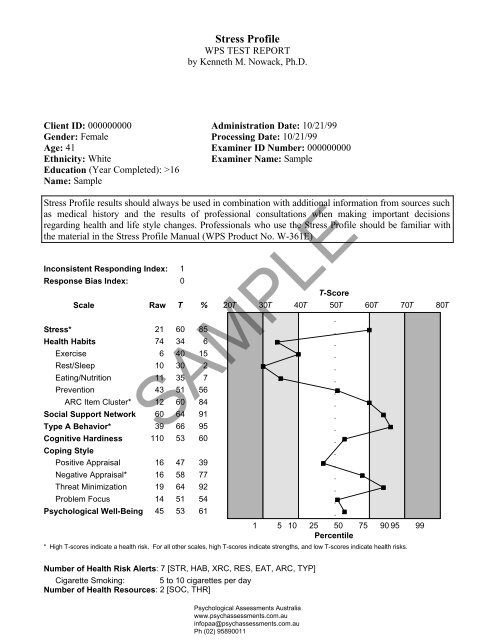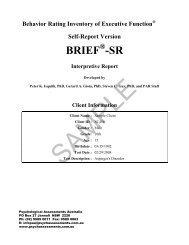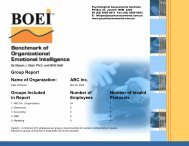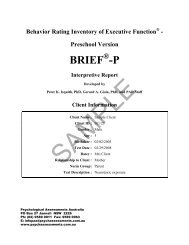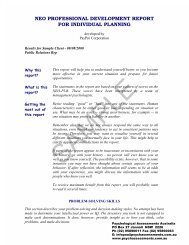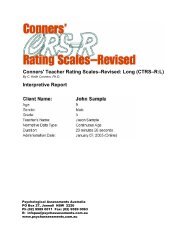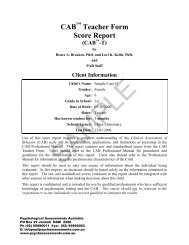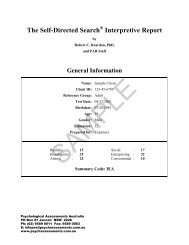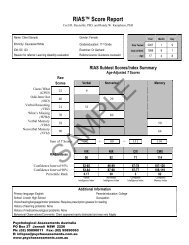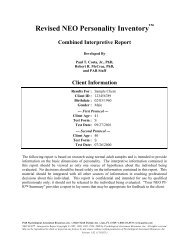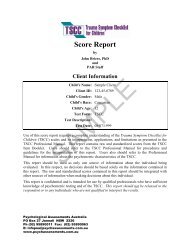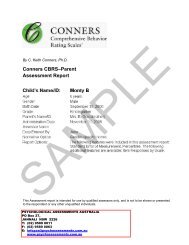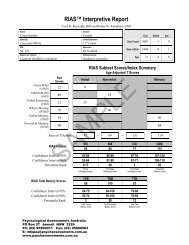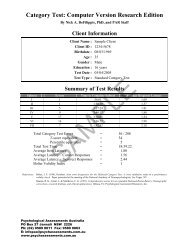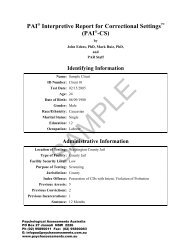The Stress Profile Sample Report - Psychological Assessments ...
The Stress Profile Sample Report - Psychological Assessments ...
The Stress Profile Sample Report - Psychological Assessments ...
You also want an ePaper? Increase the reach of your titles
YUMPU automatically turns print PDFs into web optimized ePapers that Google loves.
WPS SP TEST REPORT ID: 000000000 Page: 3over the last three months. As a result, you may be quite a bit more vulnerable to stress-related illnessesand disorders. You will benefit substantially from increasing your practice of physical, emotional, andbehavioral coping techniques to help you reduce your level of work and life stress.You reported that you frequently or always experience stress in the following areas:WorkFinancialFamilyIf these circumstances remain unchanged, they are likely to undermine your health in the long run. Yourcontinued efforts to reduce this kind of stress will provide long-term health benefits.Health HabitsHealth habits are the specific things that you do to maintain and improve both your physical healthand your psychological well-being. You have an overall Health Habits score and subscores in fourdifferent areas—Exercise, Rest/Sleep, Prevention, and Eating/Nutrition. <strong>The</strong> overall Health Habits scoreis the most useful one for getting an idea of how you compare to others in general. <strong>The</strong> five subscores aremost useful for evaluating where your health habits are strong, and where they might be strengthened.You report a low level of regular health maintenance habits. In particular, you report that you donot frequently exercise, get adequate rest or sleep, or maintain healthy eating and nutritional habits. Inaddition, you report that you are in the habit of using caffeine and cigarettes. As a result, you may besignificantly more vulnerable than others to stress-related illness. Even though it may appear in the shortrun that using caffeine, tobacco, alcohol, or other recreational drugs relaxes you or makes you better ableto cope with stress, the overuse of these substances is frequently associated with health problems. Youwill find each of your Health Habits subscores briefly discussed below.Physical Exercise. <strong>The</strong> physical exercise questions on the Health Habits scale ask about thefrequency and amount of exercise you engage in to enhance muscular tone and the cardiovascular system.Judging by your responses, your level of exercise is very low. You may wish to increase your exerciseactivity to 20-30 minutes at least three times a week. Before engaging in any strenuous exercise program,it is usually a good idea to consult a physician.Sleep/Relaxation. <strong>The</strong> Sleep/Relaxation questions ask about how regularly you are able to getadequate rest, sleep, and relaxation. Your responses indicate that you regularly experience an extremelylow level of rest, sleep, and physical and mental relaxation. As a result, you may almost always feel tired,fatigued, drained, unable to concentrate, emotionally exhausted, or inappropriately sleepy. You shouldconsider how you can take more time to physically relax, slow down, and get adequate rest and sleep,especially during those times when stress is present at work or at home.SAMPLEPrevention. <strong>The</strong> Prevention questions on the Health Habits scale ask how regularly you usecommon sense health and hygiene practices, and how often you use substances that may increase yourhealth risk. <strong>The</strong> excessive use of substances such as caffeine or alcohol and habitual or excessiverecreational use of restricted drugs are associated with an overall greater risk of experiencing healthproblems in general and stress-related illness in particular. In fact, overreliance on substances is often thefirst clear sign that some source of stress is beginning to undermine your health. For this reason, yourresponses to the substance use items on the Prevention scale are considered separately from your overallPrevention score in this section.<strong>The</strong> level of preventive health practices reflected in your responses is average. This helps todecrease your risk of developing chronic health problems over the long term. You will benefit bycontinuing to follow common sense when it comes to maintaining your health.<strong>The</strong> ARC Item Cluster is a separate score for those items on the Prevention scale that ask aboutthe use of Alcohol, Recreational drugs, and Cigarettes. <strong>The</strong>se items are grouped together in this way<strong>Psychological</strong> <strong>Assessments</strong> Australiawww.psychassessments.com.auinfopaa@psychassessments.com.auPh (02) 95890011
WPS SP TEST REPORT ID: 000000000 Page: 4because they can present similarly serious risks to your physical health. <strong>The</strong>y are also grouped togetherbecause effective programs are available for reducing their use. Your ARC Item Cluster score is high.This may be a sign that there are sources of stress in your life that have begun to affect your health. Youmay benefit from taking at look at what kinds of circumstances make you want to drink coffee or alcohol,or use other recreational drugs. Doing so may alert you to sources of stress in your life over which youwould rather have better control. Identifying such sources of stress is a key step toward freeing yourselffrom their negative effects on your health. It may also help you keep the use of these substances to aminimum, a benefit to your health in the long run.Eating/Nutrition. <strong>The</strong> Eating/Nutrition questions on the Health Habits scale ask how often youeat well-balanced, and nutritious meals and follow sound nutritional habits. You have reported a very lowlevel of healthy eating and nutritional practices. You may often miss important meals, eat a non-balancednutritional diet, or ignore the amounts of saturated fats, cholesterol, salt, and sugars that you consume.Small modifications in your eating and nutritional habits can have profound effects on your risk ofdeveloping and your ability to overcome chronic illness and diseases such as coronary heart disease,stroke, and diabetes.Social Support NetworkYour social support network is made up of the people in your life that you can count on foremotional support, advice, information, love and assistance. This network includes people at work andpeople away from work. A high score suggests satisfaction with both the size and quality of your socialsupport system. People who feel satisfied with their social support networks seem to experience betterphysical health and psychological well-being in the face of daily work and life stress. Your responsessuggest that you are quite satisfied with your social support network. This situation substantiallystrengthens your ability to resist stress-related illnesses and disorders. Your overall health will continue tobenefit as you keep and expand your social support system by initiating friendships, remain willing to beopen with others about yourself, and continue to develop trusting relationships.Type A BehaviorType A Behavior is defined as a particular pattern of responding to the pressures of daily livingand to events that are seen as challenges or threats. People who make use of this behavior pattern oftentalk and move quickly, attempt to do many things at once, work very long hours, and generally pushthemselves to the limit. <strong>The</strong>y go all out on any endeavor, suppressing fatigue. <strong>The</strong>y are competitive,hard-driving, impatient, and quick to anger. A high score on the Type A Behavior scale suggests that aperson uses a lot of these Type A behaviors in the face of work and life stress. Those who do so appearto increase their risk of experiencing job burnout, as well as physical illness, such as coronary heartdisease, and psychological distress, such as depression or anxiety.Your Type A Behavior score is high. This suggests that in the face of stress, threat, and challenge,you usually feel pressured, hurried, irritated, or impatient in coping with the demands of a typical day. Ifyou can decrease the times when you feel this way, it will help you to be substantially less vulnerable tostress-related illnesses and disorders. You will benefit by developing a calmer way of responding to workand life challenges. When you feel hurried, impatient, or frustrated, take the time to slow down andphysically relax. Also, do not underestimate the value of simply saying calming things to yourself.Cognitive HardinessSAMPLECognitive Hardiness refers to a specific set of attitudes or beliefs about work and life that arerelatively enduring from day-to-day. <strong>The</strong>se include a sense of commitment and strong interest towardwork, family, hobbies, or projects that you are involved in on a day-to-day basis, and having things thatyou look forward to doing. A sense of belonging with friends, work, and family is a component of<strong>Psychological</strong> <strong>Assessments</strong> Australiawww.psychassessments.com.auinfopaa@psychassessments.com.auPh (02) 95890011
WPS SP TEST REPORT ID: 000000000 Page: 5Cognitive Hardiness. When Cognitive Hardiness is present, daily life changes are seen as beingchallenging rather than threatening. This keeps you open to trying new experiences and helps you torecognize that change affords hidden opportunities rather than hindrances to work and life satisfaction.Finally, Cognitive Hardiness includes the belief that you have control over your life, that what you do isdirectly related to what you achieve, that success in work and life is a result of individual behavior ratherthan luck, fate, or chance, and that you can effectively achieve success in both work and life. Thisdisposition appears to buffer the potentially damaging impact of stress on well-being and directlygenerates effective coping behaviors. Thus, high Cognitive Hardiness scores suggest the possession of thekind of generally hardy outlook on life that is associated with a lowered risk for job burnout, physicalillness, and psychological distress.Your Cognitive Hardiness score is in the average range. Even though you do not have anyunusual tendency to focus on the threatening aspects of daily events, to the extent that you can becomemore aware of the positive aspects of your work and life, you may decrease your susceptibility tostress-related disorders. You can do this by working to keep a clear view of your life goals and tostrengthen your commitment to the things and people that are important to you. You will also benefitfrom finding ways to gain a stronger sense of control over any sources of stress of which you are aware.Coping StyleCoping style is defined as the most common way you deal with work and life threats, pressures,and challenges. <strong>The</strong>re is no overall Coping Style scale score, just four scores in specific areas—PositiveAppraisal, Negative Appraisal, Threat Minimization, and Problem-Focused Coping. High scores suggestthat you rely heavily on the related approach to coping in most situations that you perceive as challengingor threatening.Positive appraisal, threat minimization, and problem-focused techniques may help you cope withdaily work and life stress. In fact, avoidance may be a particularly powerful short-term strategy when youare faced with situations that are beyond your direct control. Problem-focused strategies may also assistyou in directly modifying your own environment or behavior. Negative appraisal is usuallycounterproductive to coping effectively coping with stress and may even directly contribute to sometypes of anxiety and depression.Positive Appraisal. Positive appraisal means focusing on the positive to minimize what appear tobe problems, pressures, or challenges. People do this by saying and thinking positive things about thesituation. Your score on this scale is in the average range and indicates that you use positive appraisal asoften as do most other people when coping with daily work and life stress. Still, you may want to findadditional ways to minimize stressful events or situations when they occur. You may find it of benefit todiscover positive things that you can say and think more often when you are dealing with both internaland external challenges.SAMPLENegative Appraisal. Negative appraisal is focusing or dwelling on the negative aspects ofproblems, pressures, or challenges. When you use negative appraisal, you expect the worst to happen,blame or criticize yourself, and describe the situation to yourself or others using the words“should,”ldblquote must,” or “have to” quite frequently. Your Negative Appraisal score is in the highaverage range. Your responses suggest that you use negative appraisal more often than do most peoplewhen coping with daily work and life stress. You appear more likely than most to blame or criticizeyourself. You will benefit from finding ways to become more aware of when you are trying to deal with asituation by using negative descriptions and self-talk. You will also benefit if you can refrain from doingso when you are dealing with both internal and external challenges.Threat Minimization. Threat Minimization is achieved by deliberately minimizing thesignificance of problems, pressures, or challenges. When you make a joke about a difficult situation, or<strong>Psychological</strong> <strong>Assessments</strong> Australiawww.psychassessments.com.auinfopaa@psychassessments.com.auPh (02) 95890011
WPS SP TEST REPORT ID: 000000000 Page: 6try not to think about it excessively, or consciously regard it as something that is over and done with, youare using threat minimization as a way of coping. Your Threat Minimization score is very high. Coping byminimizing threat can help ease your mind and reduce your worry about stressful events and situationsthat are beyond your control. However, it is important to use this strategy selectively, as it can jeopardizeyour health if you avoid facing situations that need your attention and that you actually can resolve.Problem-Focused Coping. You are using problem-focused coping when you attempt to changea situation, take action, make decisions, and solve problems, respond to pressures, or meet challenges.Seeking advice, asking for help, developing a plan, changing your behavior, figuring out a solution, andchanging jobs or relationships are all examples of problem-focused coping. High Problem-FocusedCoping subscores indicate that you use such strategies frequently. Your score is in the average range.This suggests that you take direct action to change or modify your environment as often as do mostpeople. Continuing to find ways in which you can constructively alter your own behavior or the behaviorof others in stressful circumstances may help to reduce your overall level of stress.<strong>Psychological</strong> Well-Being<strong>The</strong> <strong>Psychological</strong> Well-Being scale is a measure of life satisfaction in general. A high scoreindicates that you are satisfied with yourself and feel able to relax and enjoy life. Those with high scoresfeel happy with their families, work, interpersonal relationships, successes, and achievements. In general,people with a strong sense of psychological well-being report fewer stress-related illness than thosewithout such a strong sense. You report an average level of psychological well-being compared to others.Still, your long-term physical health could benefit from any efforts you can make to pinpoint areas ofyour life where you are not satisfied. Commit yourself to taking effective steps to improve thosesituations.SAMPLE<strong>Psychological</strong> <strong>Assessments</strong> Australiawww.psychassessments.com.auinfopaa@psychassessments.com.auPh (02) 95890011
WPS SP TEST REPORT ID: 000000000 Page: 7Item Responses:1. 3 17. 3 33. 4 49. 3 65. 4 81. 4 97. 3 113. 42. 4 18. 5 34. 5 50. 5 66. 3 82. 4 98. 4 114. 43. 4 19. 1 35. 4 51. 3 67. 4 83. 4 99. 4 115. 44. 4 20. 2 36. 3 52. 5 68. 4 84. 4 100. 4 116. 45. 3 21. 2 37. 3 53. 4 69. 4 85. 4 101. 4 117. 46. 3 22. 4 38. 4 54. 4 70. 5 86. 2 102. 4 118. 37. 2 23. 2 39. 5 55. 4 71. 4 87. 3 103. 3 119. F8. 2 24. 2 40. 4 56. 3 72. 3 88. 3 104. 4 120. T9. 2 25. 3 41. 3 57. 2 73. 4 89. 3 105. 3 121. F10. 4 26. 4 42. 5 58. 2 74. 2 90. 4 106. 3 122. F11. 4 27. 1 43. 4 59. 1 75. 2 91. 3 107. 4 123. F12. 4 28. 4 44. 5 60. 3 76. 1 92. 4 108. 413. 4 29. 1 45. 4 61. 1 77. 4 93. 2 109. 314. 4 30. 2 46. 4 62. 2 78. 4 94. 4 110. 315. 3 31. 3 47. 4 63. 5 79. 4 95. 4 111. 416. 2 32. 3 48. 4 64. 4 80. 4 96. 2 112. 4Response KeyT TrueF False- Missing ResponseNumber of Missing Responses: 0This report was generated based on WPS TEST REPORT Microcomputer Data Entry.SAMPLEEND OF REPORT<strong>Psychological</strong> <strong>Assessments</strong> Australiawww.psychassessments.com.auinfopaa@psychassessments.com.auPh (02) 95890011
Using and Interpreting Your <strong>Stress</strong> <strong>Profile</strong>Your <strong>Stress</strong> <strong>Profile</strong> provides you with important feedback about those factors that may affectyour ability to cope with stress and maintain a level of both physical and psychological well-being. Thisinformation can be useful in helping you to develop a commitment to cope more effectively with stress.As you can see from your <strong>Stress</strong> <strong>Profile</strong> graph, your scores include 7 Health Risk Alerts. In the <strong>Stress</strong><strong>Profile</strong> normative group, 4% had at least this many Health Risk Alerts. Your scores also indicate 2 areasthat are Health Resource areas for you. In the <strong>Stress</strong> <strong>Profile</strong> normative group, 58% had at least this manyHealth Resource areas indicated by their scores. Your Health Resource areas are likely to offset yourrisks to a certain extent. More importantly, these areas may provide resources that can be used to addressareas of risk for you in your efforts to strengthen your overall health status.Steps To Developing A Personalized <strong>Stress</strong> And Health Management Program<strong>The</strong> following steps should help you change specific aspects of your lifestyle that may assist youin your efforts to cope with work and life stress in a healthy and productive manner.Step 1: Identify areas of your lifestyle needing change. Review the <strong>Stress</strong> <strong>Profile</strong> to determine specifichealth areas or behaviors that might be modified in some way.Step 2: Build commitment to change your habits. Determine how motivated you actually are to alterspecific behaviors or make changes in your lifestyle. Brainstorm the potential barriers that might exist formaking your stress management action plan a success. Write down and review the advantages for alteringyour lifestyle now!Step 3: Become more aware of your behaviors on a day-to-day basis. Before you begin any individualchange program, you must be aware of how you are presently behaving. This awareness will serve as abaseline against which to compare your successful lifestyle changes later.Step 4: Develop an action plan to manage your stress and health. This plan should be realistic,measurable, concrete, and achievable within a specific time frame. Your ultimate goal is to initiate andmaintain a healthy approach to daily living. Use the form on the next page to develop your action plan.SAMPLEStep 5: Evaluate and monitor your progress on your stress and health management action plan. Viewlapses as a natural part of any individual change process. Remember, a lapse does not have to lead to arelapse back to your old habits! Reward yourself for success and periodically review your action plan tomaintain your lifestyle changes over time.<strong>Psychological</strong> <strong>Assessments</strong> Australiawww.psychassessments.com.auinfopaa@psychassessments.com.auPh (02) 95890011
<strong>Stress</strong> And Health Management Action PlanSpecific behavioral goal (include dates, times, situation, etc.):_____________________________________________________________________________________________________________________________________________________________________________________________________________________Is this behavioral goal challenging and realistic?_______________________________________________________________________Is this behavioral goal observable and measurable?_______________________________________________________________________How I will identify and evaluate my progress:______________________________________________________________________________________________________________________________________________I can think of the following reasons for sabotaging this goal:______________________________________________________________________________________________________________________________________________I will reward myself for successfully achieving my goal by:_______________________________________________________________________SAMPLE_______________________________________________________________________I will do the following to maintain commitment towards my goal:_____________________________________________________________________________________________________________________________________________________________________________________________________________________<strong>Psychological</strong> <strong>Assessments</strong> Australiawww.psychassessments.com.auinfopaa@psychassessments.com.auPh (02) 95890011


